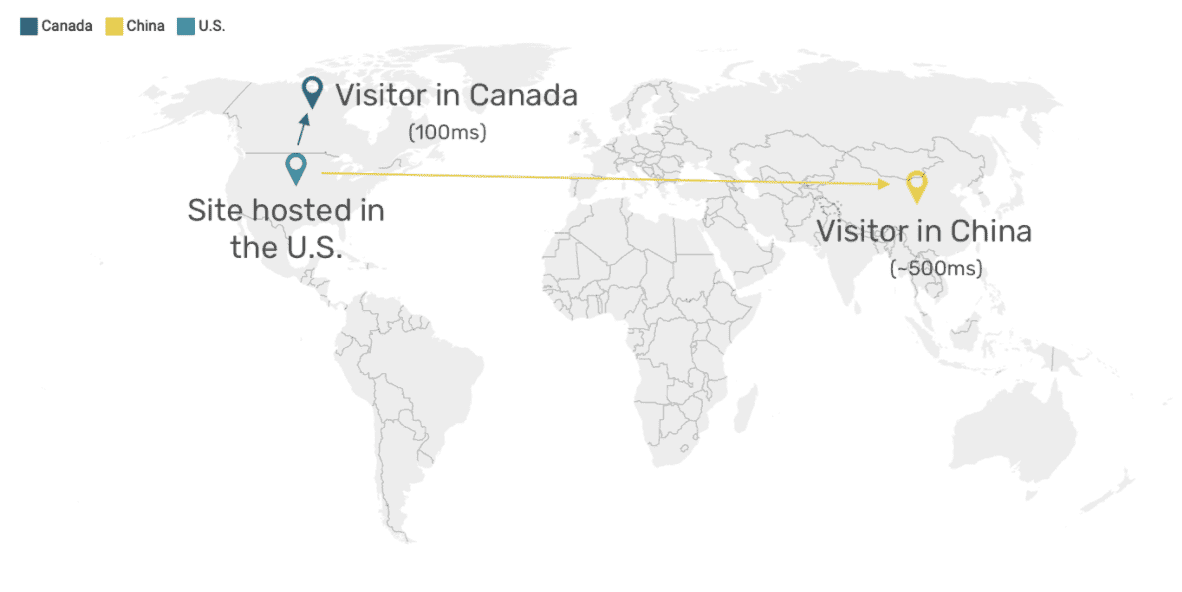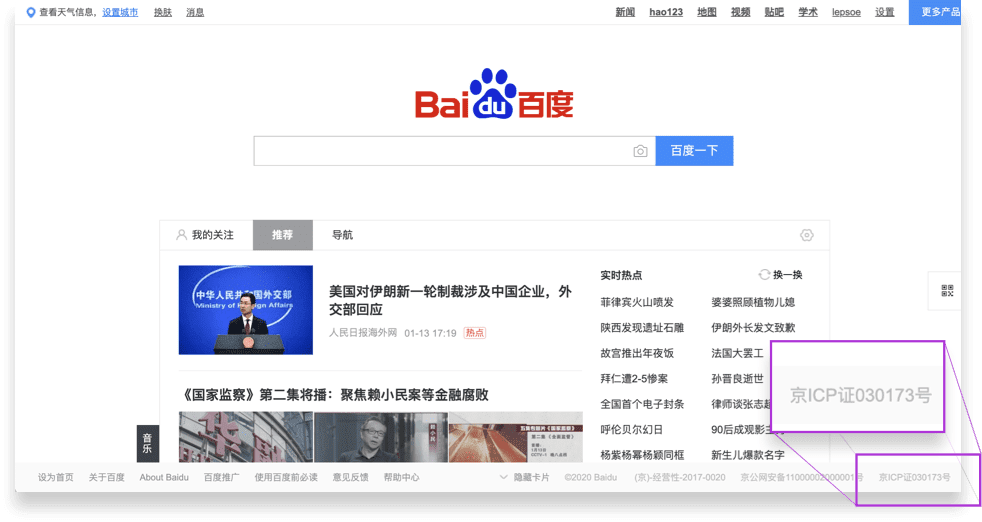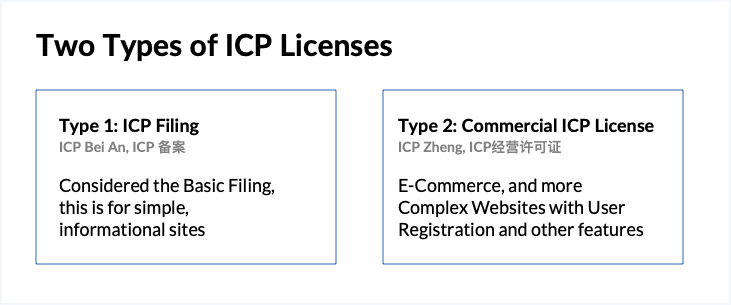1 - Expected post-Chinafy results
A 2025 guide to ICP licences in China: Do I need an ICP license for my website?
In this guide, you’ll learn:
The relationship between an ICP license and web performance in China
The differences between hosting in China (onshore) and hosting outside of China (offshore)
What an ICP license is
When an ICP license is required
How you can achieve near-native onshore performance with an offshore website
*Disclaimer: This guide is intended for informational purposes only and does not constitute legal advice. Chinafy is not a legal or corporate advisory entity. Given that legal obligations vary by business type and context, we recommend consulting with qualified legal counsel for advice specific to your organization. If needed, Chinafy can connect you with one of our experienced legal partners.
TL;DR: An Internet Content Provider (ICP) filing or commercial licence is only required if your site or app is hosted on a mainland China server. An ICP license is needed to meet legal and regulatory requirements in China rather than a way to make your site work from a technical perspective in China. If your goal is performance, Chinafy improves web performance for sites that are hosted outside China as well as onshore in Mainland China.
1. What is access to the internet like in China?
a. China internet landscape
China is set up in a unique manner that means that typical global best practices for websites often do not achieve the same end results in China.
Typically, websites that load perfectly in locations outside of China can appear broken or even in some cases unable to load in mainland China. That is because:
i) Many third-party services (e.g., Google Fonts, YouTube embeds, Facebook plugins) load slowly, incompletely, or not at all in China.
ii) China’s internet infrastructure operates through a small number of state-affiliated ISPs with limited international interconnectivity and strict network controls. These factors create additional layers of congestion, packet loss, and unpredictable latency, making performance optimization for China uniquely complex compared to other regions.
When a foreign website does load, it can sometimes take upwards of 30 seconds.

b. What is offshore vs onshore hosting?
In relation to China, offshore hosting means a website is hosted on servers outside of Mainland China. Onshore hosting means a website is hosted on servers inside of Mainland China.
If your website’s media assets are, for example, hosted in the US and delivered using Cloudflare’s Global CDN. This is what we would consider offshore hosting as both the website’s server and content delivery networks are geographically located outside of China.

The decision to host onshore or offshore depends on your business’s:
Technical requirements,
Features,
Target audience,
And available resources.
You may be assuming that hosting a website in China is the only way to ensure fast, reliable performance for users in the country. However, this isn’t always necessary and doesn’t paint the full picture.
From a technical standpoint, you do not need to necessarily host your site in China for it to achieve strong web performance.
As mentioned above, China’s unique internet environment introduces latency and packet loss for cross-border traffic, especially if your site relies on blocked or slow-performant third-party services (e.g., Google APIs, YouTube embeds). However, onshore hosting isn’t a silver bullet and poorly configured sites can still lag even on mainland servers.
Note: Onshore hosting always requires an ICP license – either a commercial ICP Bei’an or a simpler filing for non-commercial sites. Hosting providers can sometimes assist, but you’ll need a Chinese entity or partner to fulfil pre-requisites. There are also other pre-requisites such as the PSB filing and more.
2. What is an ICP License and do I need one?
TL;DR: An ICP License is a permit that allows you to host your websites on a server in Mainland China.
a. What is an ICP License?
The ICP (Internet Content Provider) certification is a permit issued at the province-level by the Chinese Ministry of Industry and Information Technology (MIIT).
The ICP permit allows you to host your website on a mainland Chinese server. All sites who wish to be hosted onshore are required to apply for and receive one before going live - a rule enforced by whoever hosts your domain name (e.g. your Service Provider or Content Delivery Network (CDN)).
ICP License numbers are typically displayed in small print on website footers with a single character to represent the Chinese province the licence was issued in, then the letters "ICP" followed by the actual ICP number itself. The number can be displayed anywhere, technically, so long as it is clear and visible.

b. What are the different types of ICP Licences and who can apply for them?
There are generally two types of ICP Licences:
ICP Filing (ICP Bei An, 非经营性ICP/ICP备案)
Considered the 'basic', or first-step, of the two - the ICP Filing is for informational websites with no intention of sales.
ICP Commercial License (经营性ICP)
For more complex sites that require e-commerce functionality and online payment integration, you'll need to first acquire i) Your ICP Filing, followed by ii) Your Commercial ICP License.

c. Why do people get ICP Licences?
An ICP License is often talked about in the context of China websites, but might not be appropriate for every company. Businesses who choose to host or deliver their website using onshore infrastructure in mainland China are required to obtain an ICP license in order to do so. Law in China requires that the ICP commercial license is needed for onshore websites of the following nature:
Advertising (网上广告)
Web building (代制作网页)
Ecommerce (电子商务)
China Server rentals (出租服务器内存空间)
Hosting (主机托管)
Web application (其它网上应用服务)
Providing information for a fee (有偿提供特定信息内容)
Read our summary of the most common requirements for an ICP here
d. Do I need to get an ICP license for my website to work for China visitors?
This question should really be asking “do I need to host onshore in China?”
At the end of the day, the decision behind whether to obtain an ICP license or not is a business decision rather than a performance-driven one. This is primarily because
the ICP license itself does not address speed issues
even using the license to use an onshore hosting server, does not fully address performance issues your website might face, such as handling third-party resources that can lead to high latency and functionality issues.
In fact, many websites are able to achieve virtually near-native website performance in China without hosting onshore. Onshore websites meanwhile, similarly benefit from Chinafy’s resource optimization suite.
3. How Chinafy improves website speed in China
Combining intelligent website optimizations and China-friendly hosting solutions, Chinafy can work with offshore websites and provide the optimized, China version of your site in as little as 2 weeks.
Here’s how Chinafy works:
Generates a version of your website for China visitors without affecting your current site.
Identifies and remediates blocked or slow resources, such as replacing Google Maps with Baidu Maps where needed.
Adds a China-friendly CDN without changing your current hosting set-up.
If you’re hosting offshore, Chinafy routes China-IP-based traffic to the China-optimized version of your site without impacting global traffic which will still see your existing site. If you’re already hosting onshore, all your traffic will see the optimized version for China visitors.
Chinafy then keeps your China-optimized site in sync with your global one, so that any changes to content are reflected accordingly.
Chinafy does not work with sites that are officially blocked.
Get in touch with Chinafy today for a free audit of your site to see how it loads in China. Chinafy can also connect you with experts if you have questions regarding compliance or regulations in China.



1 - Expected post-Chinafy results






























